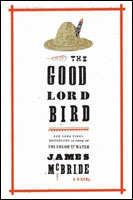 With his novel The Good Lord Bird James McBride can stand shoulder to shoulder with the likes of Mark Twain and John Steinbeck. The book is thought provoking, passionate and beautifully written. It is also a great read of the kind that will have you glued to the page and regret leaving McBride’s world when it winds to its end. You come away wishing that McBride had gifted us with, at least, two or three hundred more pages.
With his novel The Good Lord Bird James McBride can stand shoulder to shoulder with the likes of Mark Twain and John Steinbeck. The book is thought provoking, passionate and beautifully written. It is also a great read of the kind that will have you glued to the page and regret leaving McBride’s world when it winds to its end. You come away wishing that McBride had gifted us with, at least, two or three hundred more pages.
The Good Lord Bird takes place in the “Bloody Kansas” of the 1850s where the question of its being a free or slave state was being argued with swords and blood. It is the picaresque story of Henry, a young slave who is – more or less – forced into freedom. To keep his rocky freedom, life and – truth be told – have an easier time of it, he dons a dress and becomes the comely “Onion”. The moniker is bestowed by no less a personage than John Brown. “Onion” finds “herself” pulled into Brown’s orbit and witnessing the God obsessed madman’s career from the Scourge of Kansas to his martyrdom at Harper’s Ferry. Along the way Onion meets the likes of Frederic Douglass and Harriet Tubman as well as having his disguise threatened by young love and lust.
McBride surveys the institution of slavery with a cold, clear eye. One sees the horrors, degradation and twisted values that slavery inculcated. At the same time there are surprising depths of compassion for the slave, the slave owner and those around who find themselves caught up in the historical tide. Violence flares up at the drop of an insult or a madman’s whim. Historical personages we now regard as secular saints are seen to have flaws aplenty that – strangely – add to their stature rather than diminish. The only character to retain her mythic proportions is Harriet Tubman, who comes across as fierce and canny a revolutionary as any born in the 20th century. All of this is brought to us in a rollicking, very funny and truly affecting tall tale. I cannot recommend The Good Lord Bird high enough.
Jack Olcott, Page
Horseheads Branch CCLD
